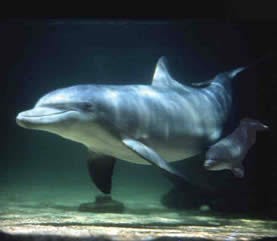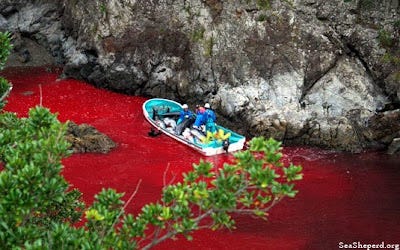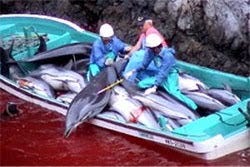The Cove

I saw the doc film "The Cove" last night and was deeply affected by it. Not just because dolphins are my favorite animal and the animal I would most like to be reincarnated into (mainly cause they are the best surfers on the planet), but because it reaffirmed my faith in the power of the individual or a small group of individuals to affect change. In exposing a secret prison beneath the sea, the Oscar winning doc also exposed a great universal truth. I understood "The Cove" to be a metaphor for many places in the world; dark, hidden lairs where crimes and atrocities are being committed regularly with impunity. Places where photography is banned, where screams go unheard, where justice is reserved for the afterlife. Like seedy discotheques, the various "coves" on our planet cannot sustain themselves once a light shines on them.
It took a group of about 10 individuals to expose one of the biggest animal-rights violations in the world today. They shone the light on "the Cove" in the stunningly beautiful coastal town of Taiji, Japan.
Every year, 20,000 dolphins are butchered in Japan to make toxic, mercury poisoned school lunches for Japanese children. The final, grisly scene shows a beautiful blue cove turn blood red as hundreds of dolphins squeal and squirm to avoid being speared to death. Of course they are trapped by nets and cannot escape. One desperate dolphin even tries jumping onto land to avoid the spear. Hundreds more of the "prettier" bottle-nose "Flipper"-like dolphins are shipped all over the world to live in captivity (a fate worse than death for an animal that swims 40 miles a day for exercise and fun). A dead dolphin is worth about 600 dollars. A live one is worth 150,000 dollars.
I learned in the film that the real-life "Flipper" committed suicide in the arms of her trainer and caretaker, Ric O' Barry, who then had a life-changing revelation: It is wrong for dolphins to live in captivity. Dolphins are highly intelligent mammals, like us. They are self-aware. If you put a dolphin in front of a mirror, it knows it's looking at itself and will inspect its body for wounds and scratches. They also have a wide range of emotions. They can experience joy and depression. They know what love is, and like us, have sex way past the age of procreation. They are super creative, often inventing cool dolphin games, which means they have imagination.
O' Barry is a modern day hero for realizing the error in his ways and having the courage to not only change himself, but change the world. He is the main protagonist in the film and has been arrested many times for freeing captive dolphins.
He decided that it was unethical for dolphins to be kept in these tiny pools with noisy crowds affecting their highly sensitive ears. He knew better than anyone that the perpetual dolphin smile is an illusion.
I urge everyone to see this film and then do four things:
1. No matter how much they beg you, refuse to take your kids to Sea World or Seaquarium or any Swim with the Dolphins facility.
2. Ask your Japanese friends to raise awareness in their own country against whaling and dolphin killing (Most Japanese aren't even aware this is going on).
3. Support or make a donation to:
Save Japan Dolphins
4. There are many more "Coves" in the world. Find one and expose it.



